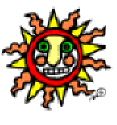En
español 
Classroom website
En
español |
Francisco Franco BahamondeMini biography: Franco is born on 4 December 1892 in El Ferrol in Galicia, northwestern Spain. His full name is Francisco Paulino Hermenegildo Teódulo Franco y Bahamonde. Franco's father is an officer in the Spanish naval administrative corps, his mother a pious and conservative upper middle-class Roman Catholic. 1907 - At the age of 14 Franco enters the Infantry Academy at Toledo, graduating three years later and receiving his first commission as second lieutenant. 1913 - Franco is promoted to first lieutenant, quickly winning a reputation for efficiency, dedication and concern for his troops' well-being. He also becomes known as a severe disciplinarian prepared to have men shot for minor infractions of regulations. 1923 - Franco is appointed commander of the Spanish Foreign Legion, which becomes notorious for the ruthlessness and brutality of its attacks on Moorish villages and plays a decisive role in bringing the Moroccan revolt to an end. Franco becomes a national hero. 1931 - The Spanish monarchy falls when king Alfonso XIII abdicates and goes into exile. Franco's career is halted. The leaders of the Second Republic introduce numerous other reforms. Women are given the vote, the Catholic Church is excluded from the education system, and divorce is legalized. Land reform measures seek to divide large estates in the south of the country among local peasants. However social conservatives view the reforms with alarm, while the Spanish economy stagnates and unemployment rises as the Great Depression grips the world. 1933 - The far right is spearheaded by a newly formed party called 'Falange' (phalanx). Falange advocates the fascist ideals of Germany's Adolf Hitler and Italy's Benito Mussolini. 1935 Franco is appointed as the army's chief-of-staff. 1936 - The conservative government is dissolved. The tension soon boils over into open violence between rival groups on the left and right. Franco is removed from the general staff and demoted. Meanwhile, rebels within the military conspire with civilian nationalists in a plot to overthrow the Popular Front. Franco decides to join the rebellion just days before it is scheduled to begin. The military rebellion is announced on the Canary Islands on 17 July, signaling the start of the Spanish Civil War. Franco is declared 'generalísimo', (commander-in-chief), and 'jefe de estado' (head of state) of the nationalist regime on 29 September. He appeals to Adolf Hitler and Benito Mussolini for help in the war effort. Both fascist leaders provide personnel, aircraft, tanks and artillery. On 28 March the nationalists take Madrid. The civil war ends on 1 April. Franco has won a complete and unconditional victory. The Second World War begins in September. Franco keeps Spain out of direct involvement in the conflict, although Spain is still viewed as a pariah state by the rest of the world. Franco is seen as the "last surviving Fascist dictator" of a country prepared to provide asylum to thousands of Nazis fleeing justice. 1947 - Following a referendum, the monarchy is reinstated. Franco's position as head of state is confirmed. He is to be regent pending the choice of a king, a position he retains for the rest of his life. 1969 - Franco designates 32-year-old prince Don Juan Carlos de Borbón, grandson of former king Alfonso XIII, as heir to the Spanish throne and his successor. 1975 - Franco dies on 20 November in Madrid. Within three years of Franco's death Spain has become a fully democratic constitutional monarchy. This information comes from: |
¡Gracias por su
visita! home |